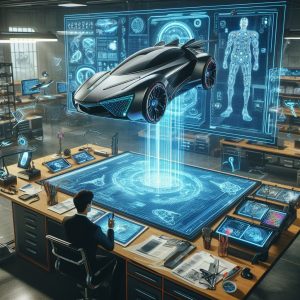The automotive industry is undergoing a significant transformation, driven by technological advancements and changing consumer preferences. As a result, the role of car salespersons is evolving, and the impact of artificial intelligence (AI) is becoming increasingly prominent. In this blog, we explore the future of car salespersons in the context of the car industry’s evolution and the influence of AI.
1. Changing Customer Behavior:
– Research Online:
Customers today are empowered with information and conduct thorough online research before making a car purchase decision. The role of salespersons is shifting from providing product knowledge to offering personalized guidance and building relationships.
– Online Purchasing:
The rise of online car purchasing platforms is changing how consumers buy vehicles. It reduces the need for face-to-face interaction with salespersons, but it also presents an opportunity for digital customer engagement.
2. Technology’s Impact:
– AI-powered Product Recommendations:
AI algorithms can analyze customer data, preferences, and market trends to provide tailored product recommendations. This enhances the efficiency of salespersons by presenting the most relevant options to customers.
– Automated Virtual Showrooms:
Virtual showrooms powered by AI allow customers to explore vehicles in detail, schedule test drives, and receive real-time assistance from salespersons, all from the comfort of their homes or mobile devices.
– Sales Chatbots:
AI-driven chatbots can engage with customers 24/7, answering inquiries, providing information, and scheduling appointments, reducing the burden on salespersons and improving customer satisfaction.
3. Evolution of the Car Salesperson:
– Consultative Role:
Car salespersons are transitioning from product pushers to consultants who educate customers about features, benefits, and suitability based on individual needs and preferences.
– Building Relationships:
The focus is shifting from making a single sale to building long-term relationships with customers, ensuring continued satisfaction and repeat business.
– Understanding Technological Advancements:
Car salespersons must stay updated on the latest technological advancements in vehicles, autonomous driving, and connectivity to provide informed guidance to customers.
4. New Skills and Training:
– Data Analysis and CRM Tools:
Salespersons must leverage data analysis tools and customer relationship management (CRM) platforms to understand customer preferences, track sales performance, and manage customer interactions efficiently.
– Digital Marketing and Social Media Engagement:
With a significant portion of car research and purchasing happening online, salespersons need digital marketing and social media engagement skills to connect with customers in the digital space.
– Virtual Reality and Augmented Reality:
Salespersons may use VR and AR technologies to provide immersive vehicle experiences, allowing customers to virtually test drive cars and explore features.
5. Collaboration with AI:
– AI as an Assistant:
AI can assist salespersons in various tasks, such as qualifying leads, scheduling appointments, and providing real-time product information, allowing them to focus on building relationships and closing deals.
– Enhanced Customer Experience:
AI can personalize customer interactions, tailoring the sales process to individual preferences and needs, resulting in a more positive and seamless customer experience.
Conclusion:
The future of car salespersons lies in embracing technology, adapting to changing consumer behavior, and evolving their role from product pushers to consultative guides. While AI is transforming the car industry, it presents opportunities for salespersons to enhance their skills, improve customer interactions, and continue playing a vital role in the car purchasing journey. By embracing AI and adapting to evolving customer needs, car salespersons can thrive in the dynamic future of the car industry.
The automotive industry is undergoing a remarkable transformation driven by technological advancements, including the increasing influence of Artificial Intelligence(AI). As a result, the role of car salespersons is constantly evolving, posing challenges but also offering new opportunities. This blog examines the potential dangers associated with the job, explores the possibility of AI replacing salespersons, and provides actionable strategies for adapting to the changing landscape.
Dangers for Car Salespersons:
- Job Displacement: Automation and AI are rapidly changing the workforce dynamics, and car salespersons are not immune. With AI-powered systems capable of handling many tasks traditionally performed by salespersons, job displacement becomes a real threat.
- Diminished Human Interaction: As AI takes over routine tasks, salespersons may have fewer opportunities for face-to-face interactions with customers, impacting the personal touch and connection that are crucial in the car-buying experience.
- Skill Gap: The rise of AI demands new skills and knowledge in car sales. Salespersons who fail to adapt to the changing landscape may find themselves ill-equipped to compete in the increasingly technology-driven market.
Possibilities of AI Replacing Salespersons:
- Limited Impact: While AI has the potential to automate certain tasks, it’s unlikely to completely replace car salespersons anytime soon. The human element remains vital in building relationships, understanding customer needs, and providing personalized recommendations.
- Collaboration: AI can become a powerful tool that complements the efforts of salespersons. By leveraging AI’s analytical capabilities and data processing, salespersons can focus on delivering a seamless and enjoyable customer experience.
How AI Will Be Used to Help Salespersons:
- Lead Generation and Qualification: AI-driven systems can analyze vast amounts of data to identify potential customers, pre-qualify leads, and provide salespersons with valuable insights into customer preferences and buying patterns.
- Personalized Recommendations: By leveraging AI’s data analysis capabilities, salespersons can offer tailored recommendations to customers, matching their specific needs and preferences with suitable vehicles.
- Real-Time Assistance: AI-powered virtual assistants can provide salespersons with real-time information, such as vehicle availability, pricing options, and financing details, enabling them to respond quickly to customer queries.
- Data-Driven Insights: AI can analyze customer interactions, sales trends, and market data to provide valuable insights that help salespersons make informed decisions, optimize sales strategies, and improve overall performance.
- Customer Relationship Management: AI can assist salespersons in managing customer relationships, tracking interactions, and providing personalized follow-ups, enhancing customer satisfaction and loyalty.
Adapting to the Changing Landscape:
- Embracing Digitalization: Salespersons need to embrace digitalization and leverage technology to enhance their skills. Online training, webinars, and digital resources can help them stay updated with the latest advancements.
- Developing Data and Analytical Skills: Expanding knowledge in data analysis and interpretation can enable salespersons to unlock the potential of AI and make data-driven decisions to improve their sales performance.
- Strengthening Communication Skills: Personal communication and relationship-building skills remain crucial. Salespersons should focus on developing empathy, active listening, and persuasive communication techniques.
- Specialization and Expertise: Specializing in a particular vehicle type, market segment, or technology can provide a competitive edge. Expertise allows salespersons to provide exceptional customer service and establish themselves as valued advisors.
- Embrace Lifelong Learning: The automotive industry is evolving rapidly, and continuous learning is essential. Salespersons should actively seek opportunities to enhance their skills, stay informed about industry trends, and adapt to the changing technological landscape.
Conclusion:
The rise of AI and automation in the automotive industry presents both challenges and opportunities for car salespersons. While the possibility of job replacement is a concern, AI’s potential to augment and enhance the role of salespersons is equally significant. By embracing digitalization, developing relevant skills, strengthening communication abilities, specializing in niche areas, and committing to lifelong learning, car salespersons can adapt to the changing landscape, retain their competitive edge, and continue to play a vital role in the car-buying process.



